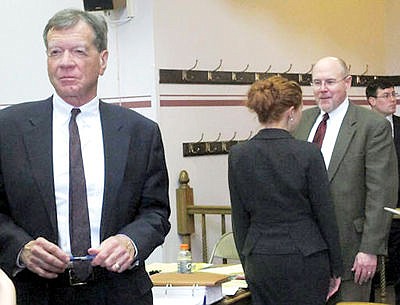Judge to decide penalties in next phase of dark money case
Now that a jury has ruled a Montana legislator took $19,599 in illegal contributions, a judge now must decide whether to impose the ultimate penalty — the removal of an elected official from office, which hasn’t been done by court order in 75 years.
District Judge Ray Dayton on Monday set a June 17 hearing in Anaconda for the penalty phase of the case against Rep. Art Wittich, R-Bozeman. On April 1, a jury found that Wittich took contributions from and coordinated his 2010 campaign with multiple nonprofit corporations affiliated with the National Right to Work Committee.
Among the issues to flesh out in deciding an appropriate punishment, Dayton will have to determine whether and how to apply a little-used state law that says a candidate convicted of violating campaign practices “must be removed from nomination or office.”
Special Attorney General John Heenan said the way that law is written, the jury’s verdict makes Wittich’s ousting mandatory.
“Every day Mr. Wittich is in office now is a day he shouldn’t be in office,” Heenan told the judge in a conference call.
In response, Wittich attorney Lucinda Luetkemeyer said Wittich is no longer holding the office he was elected to in 2010, which makes removal from office irrelevant. Dayton voiced skepticism over that argument, but told the sides to lay out their positions in court filings.
Wittich served one term in the Senate seat he won in that 2010 election where he was found to have taken illegal contributions. In 2014, he switched to the state House seat for which he is now seeking re-election against challenges from two Republican primary opponents.
Besides removal as an officeholder and a candidate, Wittich could be fined triple the amount he took in illegal and unreported contributions.
Another issue to be decided is whether the judge will rule that Wittich’s actions amount to quid pro quo corruption, such as bribery, or the appearance of it. That is an important ruling for Commissioner of Political Practices Jonathan Motl in defending the state in a federal lawsuit seeking to strike down Montana’s low campaign contribution limits.
A federal appeals court has said the state must justify the contribution limits by proving they are preventing quid pro quo corruption or its appearance.
Dayton seemed disinclined to take up the corruption issue because it was not allowed to be presented to the jury, but said he would hear both sides’ arguments for or against it.
“Why would we want to open up the can of worms about quid pro corruption?” Dayton asked.
Most campaign violation cases never see a Montana courtroom, with the great majority settled for a fine and an amended campaign finance report. That makes the high stakes in Wittich’s case unique to modern Montana politics.
“The law dealing with the penalties has been around for a long time, but this is the first time in decades that one of these cases has gone far enough to bring this law into play,” said University of Montana law professor Anthony Johnstone. “We’re not necessarily breaking new ground, but we’re breaking ground that has sat fallow for much of the 20th century.”
The last time a Montana judge removed an elected official from office was in 1940. Then, a Forsyth judge ousted Cascade County Sheriff Guy Palagi for violating the state’s Corrupt Practices Act by giving beer and tobacco to voters for their support in his 1938 re-election bid.

